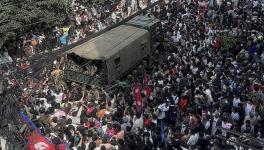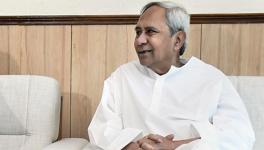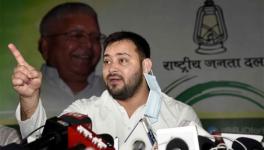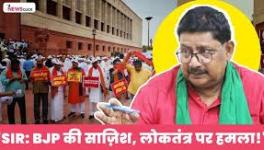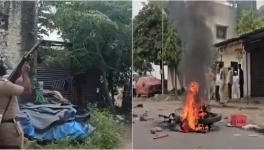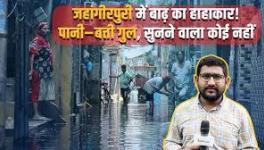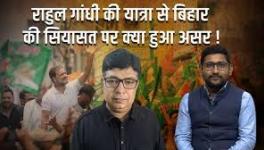Yogendra Yadav Decodes Gujarat Model, Talks About What BJP Loss Would Mean at the National Level
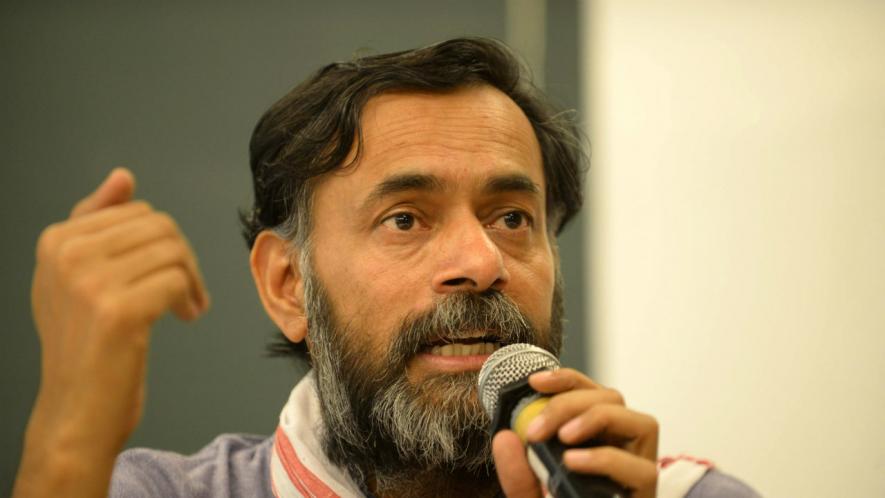
Yogendra Yadav is the National President of a new political party called Swaraj India. He is also one of the founders of the farmers’ movement ‘Jai Kisan Andolan’, and an organization called Swaraj Abhiyan. He is a political activist, an ex-academic, and a social scientist by training.
Aaquib Khan: You are in a village in Gujarat to support Jignesh Mewani, why?
Yogendra Yadav: There is a negative reason and there is a positive reason. The negative reason is to expose what’s called the ‘Gujarat Model’. This state of Western India has been projected as a model of development. I always suspected that it has a lot of publicity and very little substance.So I am here in search of that famous ‘Gujarat Model’. I am also here to expose that ‘Gujarat Model’. Specifically, Gujarat was the one state used to unleash religious strife all over the country. 15 years ago, in 2002, Gujarat witnessed one of the worst massacres against Muslims, and that, in a sense, propelled Mr Modi.He rose to the post of Chief Minister and eventually reached where he is today. Gujarat has continued to be associated with the rise of that majoritarianism and chauvinism of Hindu-Muslim strife. I am here to search for the alternative. I am here in Gujarat, which is also the birthplace of Mahatma Gandhi, to prove that this Gujarat will also provide an antidote to that communal strife. Gujarat can provide a basis for healing, for peace, for love and for harmony.
The positive reason is that in Jignesh Mewani, who is the candidate for the Vagdam constituency, I see hope for the future of India.Personally, Jignesh represents energy, he represents youth. He is just 36. Such young candidates are not very common in India. He represents struggle. He also represents the second generation of Dalit movement in India, the movement for the liberation of ex-untouchables of Indian society. The first generation was involved in the nitty-gritty of power politics.
In the 2nd generation of Dalit leaders like Jignesh Mewani, I see the possibility of a much broader vision. They are not merely representatives of their community but actually have the capacity to unite different communities.In Jignesh, I see a new kind of leadership in India, which is not dynastic, which is not just based on money, which is not mere crass pursuit of power and positions. This leadership is capable of providing a new vision for India. That’s what brings me here.
AK: You said that you are in search of the ‘Gujarat Model’.Have you found it?
YY: I must confess that I was never convinced this model existed. Statistics tell us that this state of Western India has seen slightly higher economic growth than other areas. But in terms of human development indicators, it has always been one of the middling states. In terms of the welfare of farmers, who still constitute the majority, not much has changed.In all my visits to Gujarat, I have realized that on the ground, the famous ‘Gujarat Model’ doesn’t exist.
I asked people in a public meeting,'You wanted water. Have you got it?' They said no, the water table has gone down to 1,000 feet. I asked them if the electricity supply has improved. They said no, we get just 8 hours of electricity a day. They told me they wanted a hospital. I asked them how long they have been asking for it. They replied 50 years. This was a huge village with about 10,000 residents, and it doesn’t have a decent hospital. In terms of education, Gujarat lags far behind.If the Gujarat model cannot provide water, electricity, education, health, then what kind of a model is it? What growth is it? What is that development?
AK: The counter-argument there would be that per capita income is high, the roads are good, and it is stated that Gujarat has a 24-hour electricity supply. Are these statements wrong?
YY: I am not the best person to answer if electricity is available for 24 hours.You should ask people living in the villages.If they get continuous electricity, they would tell you, they wouldn’t lie.
In the meeting in the previous village, you saw everyone say they only get 8 hours of electricity.So I guess they are not lying, not in public. There is no doubt that in aggregate terms, Gujarat has seen higher economic growth than the rest of the country. But we should remember that Gujarat was always an over-performer, ever since Independence. This I would imagine was true even before Independence. Gujarat is a coastal state, which has seen a very strong entrepreneurial tradition, strong trade, and they have always done well in terms of aggregate scores.But the question, as any decent economist would tell you, is what does this economic growth mean for the well-being of common people? That’s why I think economists gave up the figure of economic growth about 25 years ago.The world moved on to Human Development Index.We started asking, don’t tell me what is the growth rate, tell me what is the child mortality rate? Tell me what is the education level? Tell me what is women’s health like? These are the questions we should be asking, and unfortunately, when we ask these questions, Gujarat turns out to be among the middle and ordinary states. So I guess that model is mostly myth and propaganda.
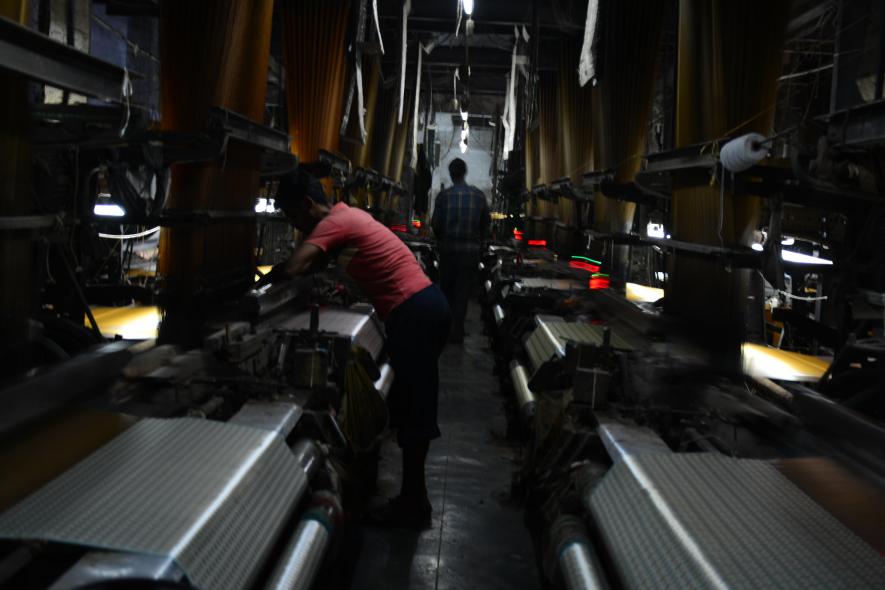
AK: Also, Modi said ‘I’ brought that model. You said the model of over-performance of Gujarat has always been there, and the effect of BJP was actually not that high.
YY: To be absolutely fair, I would credit Mr Modi for slightly raising the already high trend line. He improved the ease of business.His critics would say labour rights went down as a result of that, but yes, ease of business brought in more investment. Some of the decisions were good, some of the decisions were very shoddy, like bringing in Tata Nano with such massive states subsidies. This was supposed to be the smallest car in the world, it was supposed to be a great performer, but it has been a complete disaster. Now, private companies are allowed to fail, and that’s how capitalism grows. But when they fail with such large state subsidies, that’s something that enables us to ask questions.
AK: And also these investments are capital intensive, not labour intensive. So is Mr Modi’s argument of bringing jobs to Gujarat legitimate?
YY: No data supports this. There is nothing to support the fact that there has been more employment in Gujarat. What has contributed to whatever prosperity Gujarat has seen, is the trade links and some bit of entrepreneurship. We are currently in rural Gujarat, let's ask around. Unemployment has been very high, and the largest single occupation, farming, has been completely let down. Mr Modi promised minimum support price for crops to farmers. They were promised, but it was never delivered. Farmers are unhappy, they are angry, and I guess this particular election would witness that anger.
AK: It is hard to predict, but would you say BJP would lose seats in this elections?
YY: I dare say they might lose the election itself. I say so on the basis of some serious decent surveys that have been done. One of the most credible independent agency, the CSDS, has done a series of surveys. Four months ago, they thought the BJP was ahead by 30 percentage points, a month ago they thought BJP was 6 percentage points ahead, and three days ago, they reported that the lead has been slashed to zero now. Now my simple sense is this looks like a trend. The elections are still 7 days away in some parts, and 2 days in other parts, so it is quite likely that BJP would end up with a deficit in terms of votes.That would, of course, be extraordinary because BJP has had a stronghold in this state for the last 25 years. They haven’t lost a single election in the last 25 years, so if that happens, it would be nothing shorter than a political earthquake.But it is possible.
There are all kinds of signals in the air that point to this. I would urge you to visit any big BJP leaders in Delhi, see what kind of crowds you get there, and compare it to the kind of crowds you get at Hardik Patel’s rallies. These are signals that can’t be manufactured. Something is in the air.
AK: What is the Gujarat Model for Dalits and Muslims?
YY: The Dalit community, the ex-untouchables in the Hindu hierarchy, have not gained very much from any kind of model. It would be only fair to say that they got nothing from the previous regime either. The Congress ruled in this country and the state since independence in 1947, and Dalits of Gujarat had almost en masse supported the Congress for all those years. They got very little in terms of concrete improvement in their lives. After the BJP came in 1995, there has been a very little improvement in their lives. They haven’t got the benefits of this Gujarat Model. What they have got instead is targeted violence. The Congress regimes were attentive to this one symbolic thing.They didn’t give Dalits anything, but they did come to defend them.The BJP government doesn’t even do that. That’s the only difference I can see.
As for the Muslims, I guess its only fair to say that the Muslims of Gujarat have been reduced to second-rate citizens.What is called the riots of Gujarat were not riots, it was a one-sided massacre of Muslims. And it was presided over by Mr Modi.There is no legal proof of his involvement, but ask anyone in Gujarat, they would say he was complicit in those killings. And when the government so openly and brazenly supports those who are believed to have been involved in those massacres, the signal it gives everyone is that this is not your state, this is not your government. And it was not just one riot, this riot was followed up by Narendra Modi as Chief Minister giving repeated signals every time that Muslims are traitors and outsiders.They were made to feel like foreigners in their own country, in their own land. They live like second-rate citizens, and clearly, that’s the one thing they would like to get rid of. So the only thing they got is trading entrepreneurial opportunities outside the state of Gujarat.
AK: How is the second generation of Dalit leaders different from the first generation?
YY: India has witnessed two generations of the leadership of the ex-untouchable Hindu community. The first generation was led by charismatic figures like Kanshi Ram and Mayawati, who led Bahujan Samaj Party (BSP). They have been very successful, of course, but their entire vision revolved around their own community. They were exclusive leaders of their own community and ended up developing tensions and differences vis-à-vis with others.
What distinguishes leaders like Jignesh Mewani is their capacity to build bridges with other similarly placed communities.So there is a beginning of ‘coalition of oppressed’. This was not a part of the vision of people like Kanshi Ram and Mayawati. Second, the political project of Kanshi Ram and Mayawati was exclusively electoral. Nothing except elections were of any concern to them.
Jignesh Mewani leads fights for the struggle for land, which is very much a real-life issue for Dalits in the country today. Mayawati has been the Chief Minister of Uttar Pradesh, the largest state of the country, more than once, but she took zero interest in these life and death questions for Dalits.Leaders like Jignesh Mewani are raising those questions, and they show a path to the future.So I think and hope that this kind of leadership would become the new leadership.
AK: What do you think would be the cost of winning or losing the elections for BJP in Gujarat?
YY: BJP has been the dominant party in Gujarat for the last 25 years, this is like the PRI of Mexico, or like the Congress party used to be in India. For BJP, another win in Gujarat is no news, they have won six elections in Gujarat. It would silence some critics for some time, but it won’t actually be a big change. But if BJP loses, and I repeat that it is a real possibility this time, it would be nothing short of a political earthquake. It would change the equation, not just in the state, but it would change the national political equations.
At the end of the fourth year of Mr Modi’s government, a loss in his home state, the state from where he started his journey, the state which he wanted to project to the rest of the country and the world, a loss would be a big symbolic setback. It would also be a practical real-life setback because a loss for BJP would also mean a victory for the Congress party, who have done nothing to deserve this victory. But a victory for Congress would actually mean that the BJP will have a real contender at the national level. Suddenly, Congress’s stock will go up, and the national equations will change overnight. If that happens, the way people walk on the roads next morning will change.
We are living in times which will be remembered as an era of the absence of freedom.
Constitution has not been suspended, but liberties have been taken away.The judiciary is frightened. Media is on its knees. If BJP loses the election in Gujarat, you would suddenly see media picking-up courage to publish stories which have been lying on their desk for the last six months. You would see judiciary being able to say things that they should have been saying. And movements, protest movements of farmers, minorities, and workers, will gain strength over-night. So yes, it would be dramatic should that happen.
AK: If BJP loses, how much would Demonetisation and GST contribute to the loss?
YY: It would actually be a very small reason, but it will be played out in a very big way. When elections are analysed, you analyse it very often in terms of the more visible factors.So I am sure when the analysis is done if BJP loses, people would attribute leadership qualities to Rahul Gandhi, which probably don’t exist. They would talk of Patidar equation, and they would speak of caste equations, which to my mind are very small and marginal factors. They would talk about demonetisation and GST, which are factors. but not the real critical factors. Nobody would talk about the most boring routine factor of economic distress. A large majority of people have led a very poor existence in Gujarat. Poor quality of life, poor quality of governance, and arrogance on top. This is what people are reacting to, everything else is a moment, it’s a symbol, it’s an occasion, it's not the cost.
AK: Do you think casteism is again getting stronger in India?
YY: Caste has always existed, it has always been a factor. Sometimes the media happens to notice it and highlight it, sometimes it doesn’t make headlines. Gujarat politics has been seen as a coalition of caste.One kind of caste coalition saw the Congress in power in the 1980s. BJP brought in another caste coalition, but it was somehow never mentioned and never talked about. Now that it is beginning to fracture, everyone is talking about it. What we are witnessing is a slight shift in that coalition. But to my mind, if BJP loses, it would not be because some caste has shifted en-block from one party to another. It is because a significant slice will be taken away from each caste and community. This will be due to rural distress, which is causing the farmer to be unhappy. Farmer is the one word we should be talking about. I have heard Patidar, I have heard traders, I have heard all kinds of things, but the one most decisive factor is farmers. Agrarian crisis, rural distress, that according to me is the decisive factor this time.
Aaquib Khan (@kaqibb) is a Mumbai based independent media professional.
Get the latest reports & analysis with people's perspective on Protests, movements & deep analytical videos, discussions of the current affairs in your Telegram app. Subscribe to NewsClick's Telegram channel & get Real-Time updates on stories, as they get published on our website.










